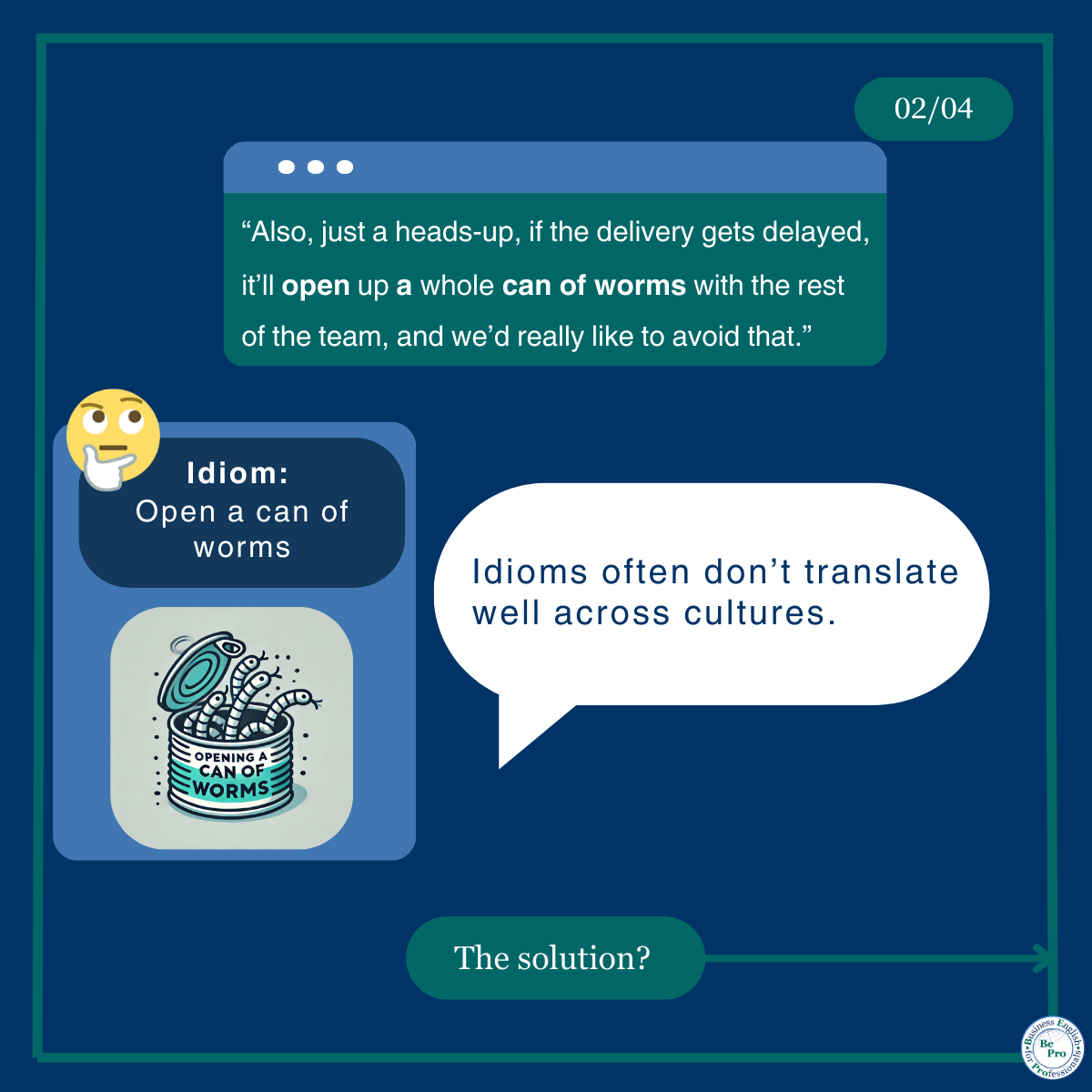💬 𝐃𝐢𝐝 𝐲𝐨𝐮 𝐤𝐧𝐨𝐰 𝐭𝐡𝐚𝐭 𝐮𝐬𝐢𝐧𝐠 𝐢𝐝𝐢𝐨𝐦𝐬 𝐢𝐧 𝐞𝐦𝐚𝐢𝐥𝐬 𝐜𝐚𝐧 𝐜𝐨𝐧𝐟𝐮𝐬𝐞 𝐲𝐨𝐮𝐫 𝐫𝐞𝐜𝐢𝐩𝐢𝐞𝐧𝐭 𝐚𝐧𝐝 𝐥𝐞𝐚𝐝 𝐭𝐨 𝐦𝐢𝐬𝐮𝐧𝐝𝐞𝐫𝐬𝐭𝐚𝐧𝐝𝐢𝐧𝐠𝐬?
For native speakers, idioms often feel natural and easy to use. For non-native speakers, they may seem like a way to show fluency. But in cross-cultural communication, idioms can create barriers, leaving the reader confused or misinterpreting your message.
🎯 𝐓𝐡𝐞 𝐈𝐧𝐬𝐢𝐠𝐡𝐭:
Idioms are culture-specific and don’t always translate well. Avoiding them ensures your message is clear, professional, and easy to understand for everyone.
𝐄𝐱𝐚𝐦𝐩𝐥𝐞:
❌ “Also, just a heads-up, if the delivery gets delayed, it’ll open up a whole can of worms with the rest of the team, and we’d really like to avoid that.”
✅ “Just to let you know, if the delivery gets delayed, it could cause problems for the team, and we’d like to avoid that.”
𝐖𝐡𝐲 𝐈𝐭 𝐌𝐚𝐭𝐭𝐞𝐫𝐬:
🌍 Avoiding idioms helps your emails stay clear and professional while removing unnecessary barriers for non-native speakers or colleagues from different cultural backgrounds.
💬 𝐖𝐡𝐚𝐭’𝐬 𝐭𝐡𝐞 𝐛𝐢𝐠𝐠𝐞𝐬𝐭 𝐜𝐡𝐚𝐥𝐥𝐞𝐧𝐠𝐞 𝐲𝐨𝐮 𝐟𝐚𝐜𝐞 𝐰𝐡𝐞𝐧 𝐭𝐫𝐲𝐢𝐧𝐠 𝐭𝐨 𝐦𝐚𝐤𝐞 𝐲𝐨𝐮𝐫 𝐞𝐦𝐚𝐢𝐥𝐬 𝐜𝐥𝐞𝐚𝐫 𝐚𝐧𝐝 𝐞𝐚𝐬𝐲 𝐭𝐨 𝐮𝐧𝐝𝐞𝐫𝐬𝐭𝐚𝐧𝐝 𝐟𝐨𝐫 𝐞𝐯𝐞𝐫𝐲𝐨𝐧𝐞? 𝐋𝐞𝐭’𝐬 𝐝𝐢𝐬𝐜𝐮𝐬𝐬 𝐢𝐧 𝐭𝐡𝐞 𝐜𝐨𝐦𝐦𝐞𝐧𝐭𝐬!
🔄 Reshare this to help your network improve their global communication skills!








